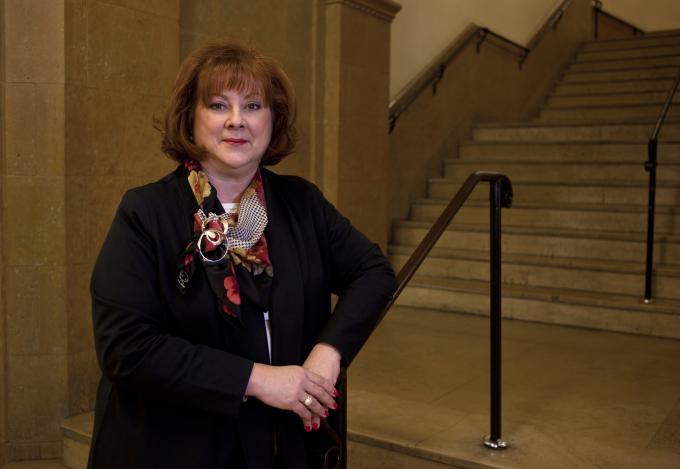Professor Lorelei Stein is an advocate for children of incarcerated parents
For the Children

The Point
Spring 2012
Lorelei Stein, Ph.D. was stunned when she first heard the statistic:
On any given day in Allegheny County, there are 7,000 children with a parent in jail or prison.
"All I could think of was the sadness and emptiness that these children must face without the love, support and guidance of that missing parent," said Stein, the program director of Point Park University's graduate program in Criminal Justice Administration.
Stein first learned about the problem of children with parents behind bars during a 2006 conversation with Claire Walker, Ph.D., executive director of the Pittsburgh Child Guidance Foundation (PCGF), and it stuck with her.
That conversation spurred her interest in researching the issue of children of the incarcerated, who live in every zip code, in affluent suburbs and in poor city neighborhoods. Always looking for research opportunities for her criminal justice students, Stein agreed to form a five-year partnership with PCGF in which the foundation funded a Point Park graduate intern every year, starting in 2006.
Pioneering a Policy
Mentored by Stein, the graduate interns did research for a county task force that was developing police guidelines for children during the arrest of a parent. Until then, there had been no set policy in Allegheny County, adding to the stress on a child who sometimes watched a parent get handcuffed and led to a police cruiser.
Sometimes a police officer would wait with the child at a neighbor's house until a relative showed up, Stein said. Other times the child would go to the county's Children and Youth Services. "Regardless of their circumstances, children of the incarcerated often become invisible."
New guidelines, which were implemented as part of a pilot program for the City of Pittsburgh in 2009, suggested that whenever the situation permitted, police officers were to handcuff a parent in a different room from the child, ask the arrested parent about an assigned caregiver, and arrange for the caregiver to pick up the child at a safe place. "We want to honor the parent's request to keep the child within the family," Stein said.
As the task force developed training for police officers, another Point Park student did research for the group.
Walker, the PCGF executive director, said she was impressed by Stein's dedication to the problem of children of the incarcerated. "She found the issue compelling and she did everything she could to address the issue. She really engaged people at the University."
For example, Stein's students held a fundraiser to buy books and games for the Allegheny County Jail's Family Activity Center, which gives children a place to play while they wait to visit a parent or other relative behind bars.
On a Mission
Helping the children victimized by the criminal justice system is just one way in which Stein, who also chairs Point Park's Institutional Review Board, has made her mark on the university.
Stein also has placed four graduates of the program in positions at the jail, including some in the reintegration program that prepares released prisoners for their return to society.
"We ask students to reach beyond what they already know and the skill set that they already have," she said. "They have done some superb work."
Stein is also stretching herself with a research project on juveniles in prison or jail in conjunction with the National Center for Juvenile Justice in Pittsburgh.
She became interested in incarcerated teenagers in 2009, when she asked former warden Ramon Rustin how many juveniles were in the county jail. She was shocked to learn there were 35, all but one a boy, and all being tried as adults on homicide charges and facing many years behind bars.
Stein knows a lot more about the county's jailed teenagers today. "We are developing a rich, descriptive picture of who are the juveniles coming through the jail, the age of their arrest, the history and their charges. How did they get there? They represent a failure of the system."
Finding 'Lost' Children
While some teens grew up in poverty and tough family circumstances, others are from stable families, she said. "Some of these juveniles come from wonderful families," she said. "Somewhere along the lines they have gotten in with friends who have taken them off track. They are almost a 'lost' child."
Stein approaches her job as program director from a multidisciplinary approach. A registered nurse anesthetist, she has been a program director for nurse anesthetist programs and has developed classes on advanced research methods.
With a Ph.D. in higher education and policy analysis, she teaches her criminal justice students to broaden their skill sets in order to expand their career options. "This generation will have multiple careers," she said. "They need to understand they need to develop a broad base of skills."
"I don't care how much money you have. You can only drive one car at one time. You can only live in one house at one time. It's your knowledge base and skill set that will always open the door."
Text by Cristina Rouvalis
Photo by Martha Rial
The Point is a magazine for alumni and friends of Point Park University.

